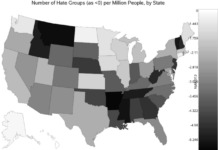Let me preface this article by saying that, not only do I think that he has the most personal integrity out of anyone running this year, but I also agree with almost all of Bernie’s policies. So this is not actually about “which side I’m on” or “which side you’re on”– the problem is with the approach to the discussion, and the vocabulary.
Bernie Sanders’s run for Democratic nominee has shaken up American politics. His fund-raising efforts, his massive support, and all the votes he’s won– these all speak to the power of his ideas and the frustration American voters are feeling with “business as usual” politics. But there’s been a dark side to Bernie’s support– Sanders proponents are filling social media with divisive, and sometimes hateful, comments. People who support Hillary Clinton are being personally attacked. It’s getting ugly. Here’s my take on what’s going wrong with “Bernie Or Bust.”
1. Bernie Has Already Won
It’s true that he hasn’t won the nomination. But his ideals have won. He went from the no-chance-in-hell rebel outsider in most people’s eyes, to being a legit dude with some good ideas. Universal, single-payer healthcare? Could work. A more progressive tax scheme? Worth a shot. The fact that these ideas and ideals are being considered as legitimate options for good ol’ capitalist America is progress in and of itself.
Yes, I get that “winning an ideological battle” is different than “winning the Democratic nomination,” but it’s still a win. Bernie Sanders cares more about the welfare of the country as a whole than he does about his own political career– in some ways, ideology is a more important win.
2. Wanting A Revolution For The Sake Of A Revolution
First, Sanders supporters said that they wanted the voters to speak. Then, when Sanders consistently received fewer votes than Clinton, they claimed the system was rigged against Sanders, and they wanted the Democratic superdelegates to nominate Sanders.
In 2008, Bernie Sanders endorsed Barack Obama on June 5th, before Clinton had exited the race. Now, Sanders supporters are condemning those who throw their support behind Clinton. What “Bernie Or Bust” proponents seem to want changes based on what will be the most benefit for Sanders. That’s not a political revolution; that’s political convenience.
3. Making The Same Points Over & Over Again Don’t Make Them More True Or Important
Anyone who supports Hillary Clinton is a “shill” and anyone who reports on her is “corporate media.” The nomination process is “rigged.” We’ve heard it all before. The problem is that although there is validity to those perspectives, they are not self-evident truths, and they do not contain a built-in conclusion or course of action.
I’m getting sick of hearing the same words over and over again, thrown around with little thought or consideration. There is a conversation to be had around Bernie Sanders’s run for president, around the problems with a two-party system, and with the delegate process. We should never stop being critical of the process by which people come into power. But name calling and an endless repetition of the same mind-numbing talking points is not the right way to go about it.
Didn’t Bernie himself make a career out of trying to engage in challenging dialogues with unresponsive people? Shouldn’t Bernie supporters be doing the same now, rather than being the unresponsive people Bernie would try to dialogue with? It’s a problem whenever a complex discussion gets turned into the same cyclical talking points, repeated ad nauseam. This is not what political revolution looks like. This isn’t even what political progress looks like.
4. Saying Clinton And Trump Are The Same
“If Hillary Clinton gets the nomination, I’m not going to bother voting in November!” I have been seeing this more and more, and it is discouraging and disconcerting. Did Bernie Sanders refuse to vote on anything, just because he felt that he wouldn’t win? Of course not, and Bernie supporters shouldn’t either.
Not to mention that, although they differ on several key issues, Sanders and Clinton have voted the same 93 percent of the time.
Yes, Clinton supported Wall Street bailouts and supports the TPP.
Yes, Sanders’s stance on gun control is not as strong as what many left-leaning folks would like.
But in both cases, it is wrong to reduce their candidacy to one issue. The fact that either candidate has a real opinion and voting record on any of these things puts them in an entirely different class than Donald Trump, and people who think otherwise are deluding themselves.
When liberal-minded folks work together, we can achieve great social progress. If Bernie’s political career has taught us anything, it is to be perpetually optimistic and to keep working toward improvement. If you believed in working towards a better America before, you should still believe in working towards a better America now. Let’s keep working, instead of sulking in a corner and spewing political nihilism.
5 All-Or-Nothing Thinking
Merriam-Webster defines “liberal” as “not opposed to new ideas or ways of behaving that are not traditional or widely accepted.” Liberals are open-minded by definition! Closed-mindedness and an unwillingness to engage with new ideas is a conservative thing.
As members of the liberal community, we must hold ourselves to a higher standard of discourse that what we’re hearing from the right. We become barriers to progress when we refuse to engage in good-faith discourse, choosing intstead of name-call and make personal attacks. We’re better than that.
I’m sure that this article will get me called “shill” and many other creative names. Which is sad, really, because I’m used to being called names from backwards conservatives. It’s too bad that I am now expecting to be called names from fellow liberals. How about instead of #NeverHillary, we try #NeverNameCalling or #NeverDisrespect? It’s less catchy, perhaps, but will ultimately lead to greater social change.
I think that we should all follow Sanders’s example and continue to be involved and invested in our collective future.
Featured image by Phil Roeder, available under a Creative Commons 2.0 license.





